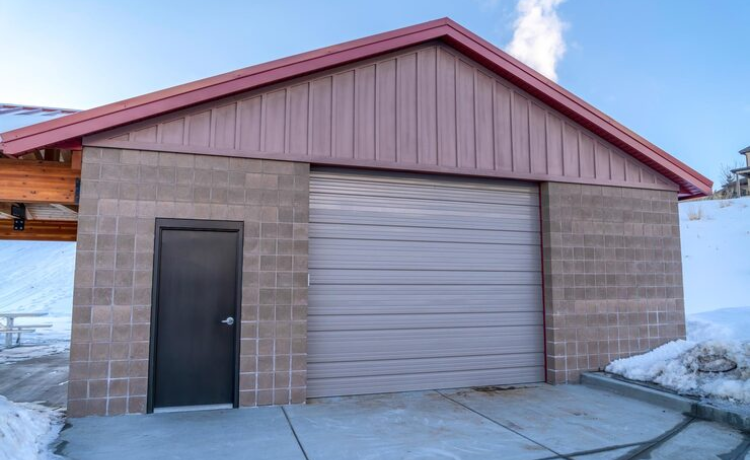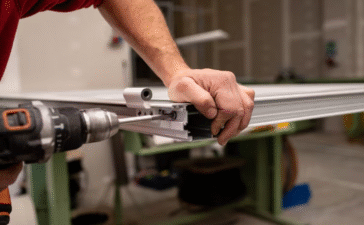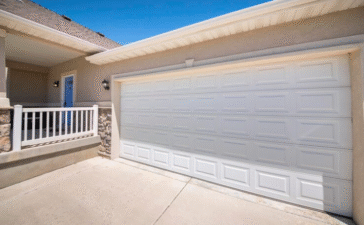Your garage door is more than just an entry point; it’s a significant part of your home’s exterior that impacts security, curb appeal, and energy efficiency. While many homeowners overlook the importance of their garage door, choosing the right one can lead to substantial savings and improved comfort. As experts in home improvement and energy-efficient solutions, we understand that an insulated garage door is a smart investment for any property. These energy-efficient garage doors are designed not just for function, but to enhance your home’s overall performance.
An insulated garage door is constructed with layers of insulation material sandwiched between the inner and outer panels. Unlike a standard, non-insulated door, which is typically a single sheet of steel or another material, an insulated model acts as a thermal barrier. This barrier prevents heat from escaping in the winter and keeps cool air inside during the summer. The benefits are immediate, ranging from lower energy bills to a more comfortable and quieter home. From a functional standpoint, insulation adds strength and durability, which protects your investment and can increase your property’s long-term value.
The Key Benefits of Insulated Garage Doors
Choosing an insulated garage door offers a range of advantages that extend far beyond simple temperature control. These doors are a comprehensive upgrade for your home.
Energy Efficiency
One of the most significant benefits of an insulated garage door is its impact on energy efficiency. Garages often share at least one wall with the main living area, and a non-insulated door can be a major source of energy loss. By installing an insulated door, you create a more stable temperature environment. This thermal insulation helps reduce heating costs in the winter and keeps your air conditioning from working overtime in the summer, leading to noticeable energy savings on your utility bills. Energy-saving garage doors are an effective way to make your home more eco-friendly and cost-effective.
Noise Reduction
If you live on a busy street or simply value a peaceful home environment, an insulated garage door can make a world of difference. The insulation material absorbs sound, effectively reducing noise from outside sources like traffic, neighbors, and weather. Additionally, the solid construction of insulated doors helps to dampen the operational noise of the garage door itself. The result is a much quieter garage and a more tranquil living space.
Durability and Protection
Insulated garage doors are built to be more robust and durable. The multi-layer construction makes them more resistant to dents, dings, and other common damage compared to their single-layer counterparts. This added strength also provides better protection against harsh weather conditions, including strong winds, heavy rain, and extreme temperatures. A weather-resistant garage door not only safeguards your vehicles and stored belongings but also maintains its appearance and functionality for years to come.
Improved Comfort
For many people, the garage is more than just a place to park cars. It often doubles as a workshop, gym, office, or recreational area. An insulated garage door helps create a comfortable garage environment by maintaining a more consistent temperature year-round. This temperature-controlled garage space becomes a more usable and enjoyable extension of your home, no matter the season.
Insulated vs. Non-Insulated Garage Doors
When choosing a new garage door, one of the primary decisions is whether to opt for an insulated or non-insulated model. Understanding the differences in cost and functionality is key to making the right choice.
Cost Comparison
There’s no question that a non-insulated garage door has a lower upfront cost. However, it’s essential to consider the long-term expenses. The higher initial price of insulated garage doors is often offset by the significant savings on heating and cooling bills over time. For homes in climates with extreme temperatures, the return on investment can be realized in just a few years. If your garage is detached and unheated, a non-insulated door might suffice. But for attached garages, investing in insulation is almost always the more cost-effective option in the long run.
Functionality Comparison
In terms of functionality, insulated doors have a clear edge. Their sturdy, multi-layer construction not only provides better thermal performance but also contributes to a longer life span. These long-lasting garage doors are less prone to warping and damage, ensuring smooth and reliable operation for years. A functional garage door comparison shows that while a non-insulated door meets the basic need of opening and closing, an insulated door enhances the overall function of your entire home by improving comfort, reducing noise, and increasing energy efficiency.
Understanding the R-Value of Insulated Garage Doors
When shopping for an insulated garage door, you’ll encounter the term “R-value.” The R-value of garage doors is a crucial indicator of their insulating effectiveness. A higher R-value means greater thermal resistance and better insulation. Choosing the right R-value depends on your climate and how you use your garage. For moderate climates, an R-value between 6 and 9 may be sufficient. In colder regions, an optimal garage door insulation level would be an R-value of 10 or higher. If your garage is climate-controlled or used as a living space, a higher R-value is recommended to maximize comfort and energy savings.
How Much Does an Insulated Garage Door Cost?
The cost of an insulated garage door can vary widely based on several factors. The material type, insulation R-value, size, style, and installation costs all influence the final garage door price. A basic, single-car insulated steel door might cost between $800 and $1,500 installed. Mid-range options with higher R-values and more design choices typically range from $1,500 to $3,000. High-end, custom doors made from premium materials can exceed $4,000. While the initial cost is higher than for non-insulated doors, the return on investment is significant. Homeowners can see annual energy savings of up to 20%, and according to Remodeling Magazine’s 2024 Cost vs. Value report, a new garage door can recoup over 100% of its cost at resale, making it one of the best value-for-money home improvements.
Choosing the Right Insulated Garage Door for Your Home
Selecting the perfect insulated garage door involves considering materials, style, and your specific needs.
Types of Insulated Garage Doors
Insulated doors are available in various materials, each offering different benefits. Steel doors are popular for their durability and affordability, and they often feature a core of polystyrene or polyurethane insulation. Polyurethane garage doors typically have a higher R-value as the foam expands to fill all cavities, creating a stronger and more efficient barrier. Other materials include fiberglass, aluminum, and wood, which offer different aesthetic and maintenance profiles. Style options are also plentiful, with sectional, roller, and up-and-over doors all available with insulation.
How to Choose the Best Insulated Door
To buy the best insulated garage door, consider your local climate, how you use your garage, and your budget. In a harsh climate, a door with a high R-value is a wise investment. If your garage is a workspace, noise reduction and temperature stability are key priorities. Always factor in the importance of professional garage door installation. Proper sealing and fitting are crucial to ensure the door delivers its maximum insulation benefits and operates safely.
DIY or Professional Installation?
While DIY garage door insulation kits are available, they are generally less effective than a factory-insulated door. These kits, which usually involve attaching foam panels to your existing door, can improve insulation but won’t match the thermal performance or durability of a professionally manufactured and installed door. Garage door systems have high-tension springs and cables that can be dangerous to work with. For safety and to ensure maximum efficiency, professional garage door installation by qualified garage door experts is highly recommended.
Also Check: “garage door trim“
Top Insulated Garage Door Brands
Several reputable brands lead the market in high-quality insulated garage doors. Clopay is known for its wide range of styles and Intellicore® polyurethane insulation. Amarr offers durable steel doors with excellent energy efficiency and low-maintenance designs. Overhead Door, a pioneer in the industry, provides a variety of reliable and high-performance insulated doors. Customer reviews for these top brands often highlight their durability, quiet operation, and noticeable impact on energy bills, making them some of the best garage door brands available.
A Smart Investment for Your Home
An insulated garage door is a worthwhile investment that delivers benefits far beyond simple aesthetics. From significant energy savings and noise reduction to enhanced durability and improved comfort, it is a practical upgrade that adds tangible value to your property. By carefully considering your needs and choosing the right product, you can transform your garage into a more functional, comfortable, and efficient part of your home.
FAQs
Do insulated garage doors make a big difference in energy bills?
Yes, they can make a significant difference. By preventing heat transfer, an insulated door helps maintain a stable temperature in your garage and adjacent living spaces. This reduces the strain on your HVAC system, which can lower your heating and cooling costs by up to 20% annually, depending on your climate and garage usage.
How long does an insulated garage door last?
Insulated garage doors are built with multi-layer construction, making them more durable and resistant to wear and tear than non-insulated doors. With proper maintenance, a high-quality insulated garage door can last 20 to 30 years or even longer, offering excellent long-term value.
Can I insulate my existing garage door?
Yes, you can insulate an existing garage door using DIY kits, which typically include foam panels or reflective barriers. While this can provide some level of insulation, it is generally not as effective as a factory-insulated door. Professional installation of a purpose-built insulated door ensures a proper seal and optimal thermal performance.
Are insulated garage doors more secure?
Insulated garage doors are generally more secure than their non-insulated counterparts. Their robust, multi-layer construction makes them more difficult to break through. This added strength provides an extra layer of protection for your home and belongings.
What’s the difference between polystyrene and polyurethane insulation in garage doors?
Polystyrene is a rigid foam board fitted into the door panels. It is a cost-effective option that offers good insulation. Polyurethane is a foam that is injected into the door’s cavity, where it expands to fill the space completely. This creates a stronger bond with the door panels, resulting in higher structural integrity and a better R-value (insulation efficiency) compared to polystyrene.












